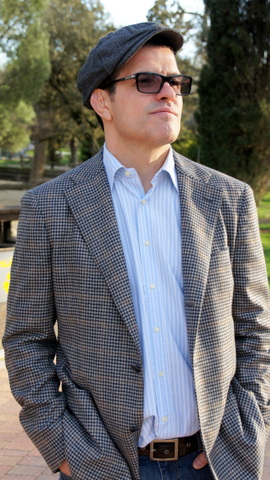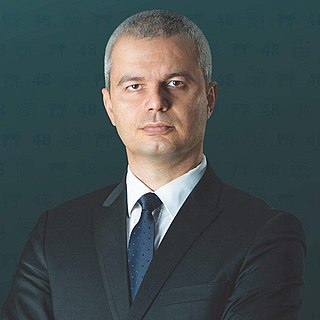The Movement for an Equal Public Model is a political party in Bulgaria representing Romani minority interests, founded on 15 December 2002 and registered as a party on 14 March 2003. It was part of the United Democratic Forces when it ran in its first legislative elections on 25 June 2005. The electoral alliance won 8.4% of the popular vote and 20 out of 240 seats.

Chernomorets Stadium is a multi-purpose stadium in Burgas, Bulgaria. It was used mostly for football matches and was the home ground of Chernomorets Burgas and FC Chernomorets 1919 Burgas.
Orlintsi is a village in Sredets Municipality, in Burgas Province, in southeastern Bulgaria. As of 2007 it had a population of 353.

Evelin Banev, also known by his nickname Brendo is a real estate developer, published writer, and former wrestler who has been convicted of money laundering and drug trafficking.

Alfa TV is a Bulgarian television channel owned and operated by the political party Ataka. The channel aired primarily social and political programs that reflect the views of the party in a direct manner. The channel has been described as pro-Russian.

From mid-2013 to mid-2014, a series of demonstrations were held in Bulgaria, mainly in the capital Sofia, against the left-wing coalition cabinet of Oresharski. The demonstrations started on 28 May 2013, but actual large-scale protests did not emerge until 14 June.
Maya Bozhidarova Manolova is a Bulgarian politician and the leader of the political movement Stand Up.BG, part of the Stand Up! Mafia, get out! coalition. She was formerly the vice-chairperson as well as a deputy in the Bulgarian National Assembly, as well National Ombudsman of Bulgaria.

Angel Chavdarov Dzhambazki is a Bulgarian nationalist politician who served as Member of the European Parliament from 2014 to 2024. He is also a co-chairman of VMRO, having joined the nationalist party's youth organization in 1997 and gradually progressed through its ranks.

This table lists all international variants in the television game show franchise Who Wants to Be a Millionaire? that have been broadcast since the debut of the original British version of the show on 4 September 1998.

Kostadin Todorov Kostadinov is a far-right and ultranationalist Bulgarian politician. He is the chairman of the ultranationalist Revival party.

The first round of the local elections for mayors and municipal councilors on both the local and provincial level in Bulgaria were held on 27 October 2019. The second round of the election took place on 3 November, as per the decree signed by the President of Bulgaria. 6,227,901 Bulgarians were included on the voter lists and were eligible to vote, a 136,000 voter reduction compared to the 2015 local elections.
Democratic Bulgaria is a political alliance in Bulgaria. Founded on 12 April 2018 as an electoral alliance between three political parties – DaB, DSB and the Green Movement, it merged into PP-DB in 2023. In April 2024 the Green Movement left PP-DB. DaB and DSB maintain close relations and brand themselves as "Democratic Bulgaria".

The COVID-19 pandemic in Bulgaria was a part of the worldwide pandemic of coronavirus disease 2019 caused by severe acute respiratory syndrome coronavirus 2. The virus was confirmed to have spread to Bulgaria when the country's first cases, a 27-year-old man from Pleven and a 75-year-old woman from Gabrovo, were confirmed on 8 March 2020. Neither of the two had traveled to areas with known coronavirus cases which is maybe because the PCR test that was used is defective. The man tested positive for the virus after being hospitalized for a respiratory infection, and authorities announced plans to test several people who were in contact with the two individuals. Two other samples in Pleven and Gabrovo were positive on 8 March. Patient zero remains unknown.
Events in the year 2011 in Bulgaria.

Daniel Dimitrov Panov is a Bulgarian politician of GERB who has been the mayor of Veliko Tarnovo since 2011.

The COVID-19 vaccination in Bulgaria is an immunization campaign currently taking place against SARS-CoV-2, the virus that is the cause of the COVID-19 disease. It began on 27 December 2020, in line with most other countries in the EU, and is in response to the ongoing pandemic in Bulgaria. The vaccination drive was affected by organizational and supply-related issues during the initial months while since the spring of 2021 vaccine hesitancy has contributed significantly to the country having the lowest rate of inoculations in the EU, with 35% of Bulgaria's adult citizens, and 30% of its eligible population, fully vaccinated by May 2022.

The Bulgarian National Unification is a Bulgarian nationalist political party. The leader of the party is Georgi Georgiev-Goti.
We Continue the Change, sometimes translated as Change Continues, is a centrist, anti-corruption political party and formerly an electoral alliance in Bulgaria led by Kiril Petkov and Asen Vasilev. It was founded ahead of the November 2021 election. The party was officially registered on 15 April.

The GERB–SDS is a Bulgarian two-party political coalition between GERB and the Union of Democratic Forces, headed by Boyko Borisov.

Kalin Georgiev Stoyanov is a Bulgarian law enforcement worker and politician who was the Minister of Interior in the Denkov and First Glavchev Caretaker Government. A political independent, he has worked for the Ministry of Interior since 2003, holding the position of head of the General Directorate Combatting Organised Crime between 2021 and 2023.
















